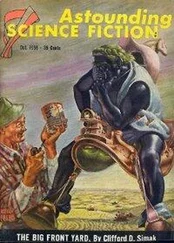The flames shot through the roof with a gusty sigh, curled skyward, painting the pall of smoke with a bloody hue. One peak of the roof crumbled in as the fire raced through the seasoned timber. In the back something exploded with a whoosh, and for a moment the street was lighted by a garish flare that seemed to illuminate even the racing flames, then thick black clouds of smoke blotted it out.
The kerosene drum had gone up.
The building was dissolving, tongues of fire licking through the solid wall. Someone screamed a warning and the building went, the upper structure plunging in upon the flame-eaten nothingness that lay beneath it. Burning embers sailed into the street and the men ducked as they thudded in the dust.
For a moment the crowd stood stricken into silence, and all that could be heard was the hungry soughing of the fire as it ate its way into oblivion.
Men who had been rushing from the windmill with water to douse the side and roof of the sheriff’s office to keep it from catching fire, lowered their buckets and as the fire died down a new sound came: the clanking of the windmill.
Through the crowd came Bill Robinson, face white, shirt smoldering where a brand had fallen. He stopped in front of Carson.
“Everything is gone,” he said, almost as if he were talking to himself. His eyes were looking beyond Carson, scarcely seeing him. “Everything. I’m ruined. Everything. …”
Carson reached out a hand and gripped the man by the shoulder, but he wrenched away and shook his head, and plodded down the street. Men stood aside to let him pass, not knowing what to say.
Gordon Purvis was at Carson’s elbow. He said quietly: “We’ll have to figure out something. Pass the hat –”
Carson nodded. “We may as well go back to the office. Nothing we can do here.”
A man came leaping through the open door of the Tribune , saw them and headed toward them at a run. Carson saw that it was Jake. And as the man drew near he knew there was something wrong.
“The type!” gasped Jake. “All over the floor and throwed out the door. And someone’s used a sledge on the press –”
Carson broke into a run, heart down in his stomach, his stomach squeezing to put it back in place, the cold feet of apprehension jigging on his spine.
What Jake said was true.
The back shop was a shambles. Every type case had been jerked out of the cabinets and emptied, some of it heaved out of the door into the grass along the path that ran to the livery stable. The press was smashed as if by a heavy sledge. The same sledge had smashed the cans of ink and left them lying in sticky gobs upon the floor.
The work of a moment – of just the few minutes while the fire was racing through Robinson’s store.
Carson stood slump-shouldered and stared at the wreckage.
He finally turned wearily to Purvis. “I guess,” he said, “we don’t print that extra after all.”
Purvis shook his head. “Now we know that fire was no accident,” he declared. “They wanted us out of here, and they picked a way that was sure to get us out.”
They went back to the office and sat down to wait, but no one came in. Outside, hoofs pounded now and again as men mounted their horses and headed out of town. The hum of voices finally subsided until the street was quiet. Sound of occasional revelry still came from the North Star. The windmill, which no one had remembered to shut off, clanked on in the rising wind. The embers of the fire across the street still glowed redly.
Purvis, tilted back in his chair, fashioned a smoke with steady fingers. Jake hauled a bottle from his pocket, took a drink and passed it around.
“I guess they aren’t coming back,” said Purvis, finally. “I guess all of them feel the way that Owens felt. All of them plumb scared.”
“What the hell,” asked Jake, “can you do for a gang like that? They come in here wantin’ help, and now –”
“You can’t blame them,” said Carson, shortly. “After all, they have families to think of. They have too much at stake.”
He picked up a pencil from his desk, deliberately broke it in one hand, hurled the pieces on the floor.
“They burned out Robinson,” he said. “Cold-bloodedly. They burned him out so they could wreck the shop. So they could stop that extra, scare us out of town. A gang like that would do anything. No wonder the other fellows didn’t come back. No wonder they high-tailed for home.”
He glanced at Purvis. “How do you feel?” he asked.
Purvis’ face didn’t change. “Got a place where I can stretch out for the night?”
“Sure you want to?”
“Might as well,” said Purvis. “All they can do is burn down my shanty and run off my stock.” He puffed smoke through his nostrils. “And maybe, come morning, you’ll need an extra gun.”
Carson awoke once in the night, saw Jake sitting with his back against the door, his head drooping across one shoulder, his mouth wide open, snoring lustily. The rifle lay across his knees.
Moonlight painted a white oblong on the floor and the night was quiet except for the racing windmill, still clattering in the wind.
Carson pulled the blanket closer around his throat and settled his head back on his coat-covered boots which were serving as a pillow. In the cot, Purvis was a black huddle.
So this is it, thought Carson, staring at the moonlight coming through the window.
The press broken, the type scattered, the men he had been working for deserting, scared out once again by the guns that backed Fennimore. Nothing left at all.
He shrugged off the despair that reached out for him and screwed his eyes tight shut. After a while he went to sleep.
It was morning when he awoke again, with the smell of brewing coffee in his nostrils. Jake, he knew, had started a small fire in the old air-tight heater in the back. He heard the hiss of bacon hit the pan, sat up and hauled on his boots, shucked into his coat.
The cot was empty.
“Where’s Purvis?” he called to Jake.
“Went out to get a pail of water,” said Jake. “Ought to be good and cold after running all night long.”
Somewhere a rifle coughed, a sullen sound in the morning air. Like a man trying to clear a stubborn throat.
For a moment Carson stood stock still, as if his boot-soles were riveted to the floor.
Then he ran to the side window, the window looking out on the windmill lot, half knowing what he would see there, half afraid of what he’d see.
Purvis was a crumpled pile of clothes not five feet from the windmill. The pail lay on its side, shining in the sun. A vagrant breeze fluttered the handkerchief around Purvis’ neck.
The town was quiet. The rifle had coughed and broken the silence and then the silence had come again. Nothing stirred, not even the wind after that one solitary puff that had moved the handkerchief.
Carson swung slowly from the window, saw Jake standing in the door to the back room, fork in one hand, pan of bacon in the other.
“What was it?” Jake demanded. “Too tarnation early in the morning to start shootin’.”
“Purvis,” said Carson. “He’s out there, dead.”
Jake carefully set the pan of bacon on a chair, laid the fork across it, walked to the corner and picked up his rifle. When he turned around his eyes were squinted as if they already looked along the gun-barrel.
“Them fellers,” he announced, “have gone a mite too far. All right, maybe, to shoot a hombre when he’s half-expectin’ it and has a chance at least to make a motion toward his own artillery. But ’taint right bushwhackin’ a man out to get a pail of water.”
Jake spat at the mouse-hole, missed it. “Especially,” he declared, “before he’s had his breakfast.”
Читать дальше












